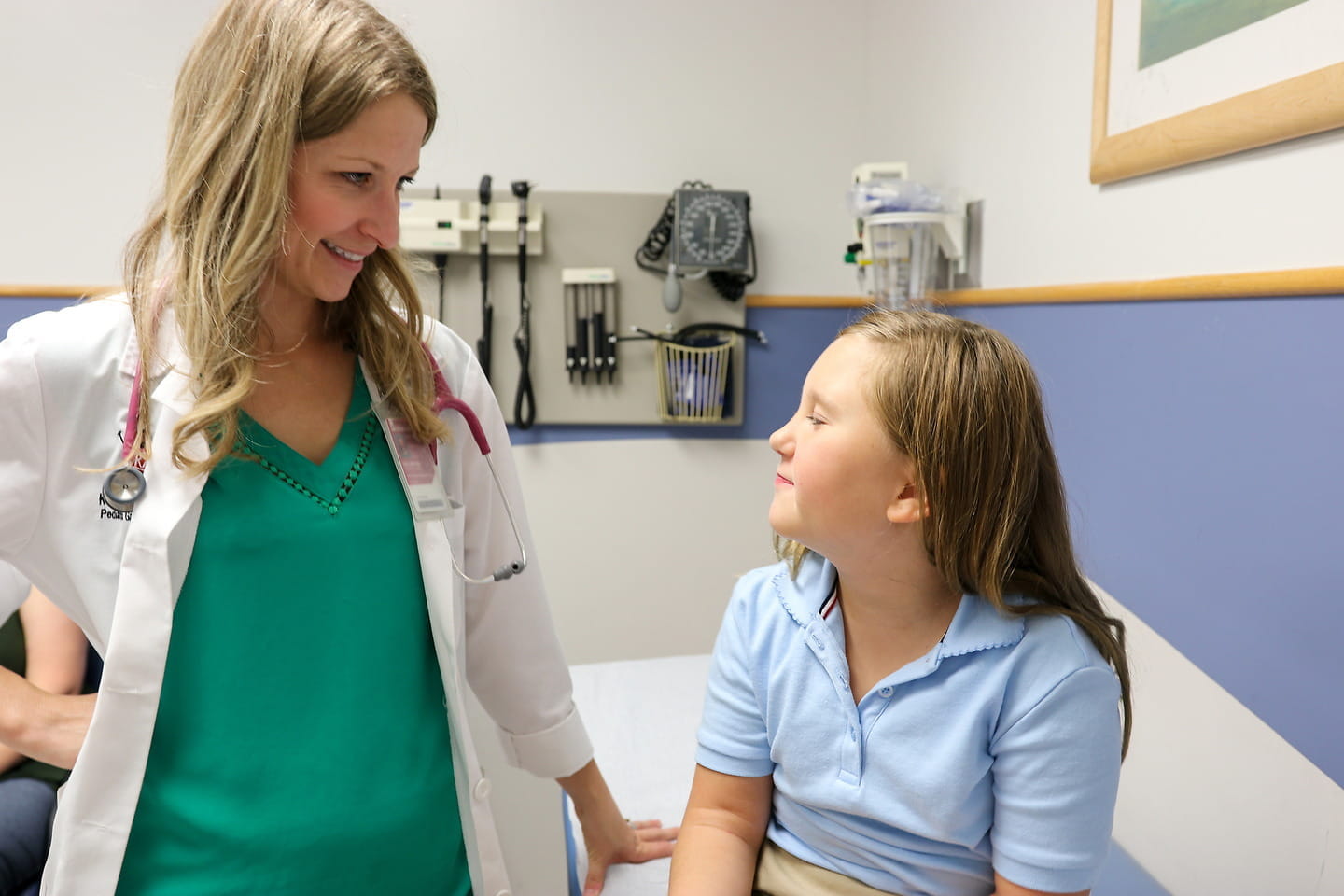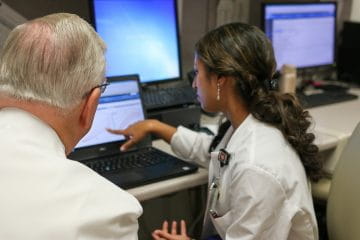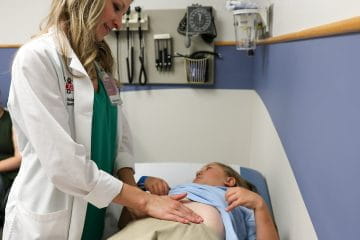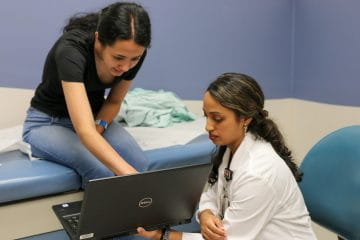
The Pediatric Gastroenterology, Hepatology and Nutrition Fellowship at Indiana University School of Medicine is one of the pioneering pediatric GI programs in the United States. Our fellows benefit from an outstanding core faculty recognized both nationally and internationally. This three-year, ACGME-accredited fellowship program is designed to provide comprehensive clinical training in all aspects of pediatric gastroenterology. Fellows acquire the skills necessary to excel in patient care, research and teaching.
Research is seamlessly integrated into the training program, fostering the development of fellows for active participation in academic medicine. The fellowship is clinically intensive, ensuring that trainees become proficient in all procedures and protocols for evaluating and managing diseases of the gastrointestinal tract, liver and pancreas. Training is primarily conducted at Riley Hospital for Children at IU Health in Indianapolis, IN. Fellows benefit from a statewide referral base, offering a large and diverse clinical volume and a high faculty-to-fellow ratio within a collegial environment.
IU School of Medicine fellowship graduates are well-prepared as skilled educators, committed to discovering new knowledge and imparting it to others. Department-supported fellowship seminars enhance cross-specialty competency and peer group development. Additionally, fellows have access to unique academic opportunities, including programs for master’s degrees in clinical research and public health, the Academy of Teaching Scholars Program and a global health curriculum for clinical and research initiatives.
Our curriculum is designed to be tailored to individual interests and career goals, offering three distinct pathways: the clinical educator pathway, the research pathway and the special interest pathway.
Apply for Fellowship
Physicians interested in the Pediatric Gastroenterology, Hepatology and Nutrition Fellowship at IU School of Medicine should submit an application through the Electronic Residency Application Service (ERAS) and include the required documents.
Video
Hear what the Pediatric Gastroenterology Fellowship has to offer.
Program Leadership
A Letter from the Program Director
Welcome to the Pediatric Gastroenterology, Hepatology, and Nutrition Fellowship Program at Indiana University School of Medicine!
We take pride in offering a comprehensive and in-depth training experience. Our fellows are exposed to the full spectrum of pediatric gastroenterology through our general GI clinics and extensive multidisciplinary programs. As Riley Hospital for Children is Indiana’s only comprehensive children’s hospital, we handle a large volume of patients from across the state and surrounding regions.
Training the next generation of pediatric gastroenterologists is one of our core missions. Throughout their three-year training, fellows are regarded as colleagues and junior faculty members, gradually gaining more autonomy. Our program provides robust procedural experience, encompassing all common diagnostic and advanced therapeutic endoscopic procedures used in pediatric gastroenterology.
Our division features nationally renowned faculty members with expertise in various areas of gastroenterology, including inflammatory bowel disease, hepatology/transplant hepatology, motility disorders, eosinophilic gastrointestinal diseases, pancreatic disease, celiac disease, aerodigestive disease, nutrition support/intestinal rehabilitation, and obesity/weight management, among others. Under the mentorship of our faculty, fellows can choose to complete their required research project in any area, including basic, clinical and translational research.
We are delighted by your interest in our fellowship training program! We encourage you to explore all aspects of our division on this website as well as the Riley Hospital for Children website.
Welcome to IU School of Medicine!

Curriculum
Fellows become proficient in all procedures that are employed in the evaluation and management of patients with dysfunction of the gastrointestinal tract, liver and pancreas. They also develop experience in nutritional assessment, and in the design of enteral and parenteral nutritional rehabilitation options during the fellowship program. Time is allotted during all three years of the training program for the development of clinical, translational or bench research skills. Fellows also participate in the preparation and presentation of clinical observations and data generated by well-designed research protocols and are active participants in the generation of manuscripts for publication.
Inpatient service and consultation services: six months
On the inpatient service, fellows oversee a multidisciplinary team including residents, medical students, pharmacists, dietitians, social workers and case managers in the management of all inpatients. Fellows provide inpatient consultation services along with faculty. Fellows participate in all inpatient and consult endoscopies during these months.
Outpatient GI clinic and endoscopy suite: one month
Fellows participate in endoscopies throughout the year, with one month early in fellowship is dedicated to building endoscopic skills and learning outpatient GI.
Nutrition Support: one month
Transplant Hepatology: one month
Elective: two months
Research: one month
Continuity clinics: Year-long
Continuity clinics are held one to two half-days a week during non-service months.
Inpatient service and consultation services: four months
On the inpatient service, fellows oversee a multidisciplinary team including residents, medical students, pharmacists, dietitians, social workers and case managers in the management of all inpatients. Fellows provide inpatient consultation services along with faculty. Fellows participate in all inpatient and consult endoscopies during these months.
Research: eight months
Continuity clinics: Year-long
Continuity clinics are held one to two half-days a week during non-service months.
Inpatient service and consultation services: two months
On the inpatient service, fellows oversee a multidisciplinary team including residents, medical students, pharmacists, dietitians, social workers and case managers in the management of all inpatients. Fellows provide inpatient consultation services along with faculty. Fellows participate in all inpatient and consult endoscopies during these months.
Advanced procedures: one month
Research: nine months
Nine months of training are dedicated to research activities, manuscript preparation and completion of fellowship work products.
Continuity clinics: Year-long
Continuity clinics are held one to two half-days a week during non-service months.
This track is geared towards fellows who are planning a career as a physician scientist. Excellent candidates for this pathway include both MD-only and MD-PhD candidates with extensive research track records. Electives are geared predominantly toward research-related activities. The timing of clinical rotations can be adjusted to accommodate research pursuits.
This track is geared toward fellows who wish to become academic clinicians as well as clinical educators and develop expertise in a specific area within gastroenterology. After the first year, the fellow will have the opportunity to focus on a particular clinical area such as inflammatory bowel disease, pancreatobiliary diseases, therapeutic endoscopy, motility, nutrition, cystic fibrosis or liver disease. The fellow will engage in a clinical research project within that area of interest and work to develop the specialized skills in the selected field.
This track is designed for fellows with interests beyond research. This can include, for example Global and Tropical Health, Clinical Educator, and Adolescent Medicine Pathways.
During elective rotations fellows can choose from nutrition support, transplant hepatology, inflammatory bowel disease, neurogastroenterology/motility, aerodigestive, weight management, advanced endoscopy, research or special elective.
Educational conferences are attended by all faculty and fellows in the division. GI/Pathology is held twice monthly. Monthly conferences include Research Conference, GI/General Surgery/Radiology Conference, ImproveCareNow Conference, Fellow’s Didactic Conference and Journal Club. Morbidity and Mortality Conference is held quarterly.

On-Call Duty
The fellows have out-of-hospital call responsibilities during all three fellowship years. The call responsibilities are equally divided among the fellows.

Pediatric Gastroenterology and Hepatology Research
Innovation and advancing the field are prime foci for both our trainees and faculty. The Department of Pediatrics ranks perennially in the top 10 in NIH funding and total research funding in the United States. The Division of Pediatric Gastroenterology, Hepatology and Nutrition at IU School of Medicine has an outstanding record of innovative research across basic, translational, and clinical sciences. This includes routine, broad participation in clinical trials and national networks involving leading-edge treatments and therapies, engagement in implementation sciences, and basic-translational studies. Over just the past 2 years, our investigators have published in top-tier journals, including Gastroenterology, Hepatology, JPGN, Clinical Gastroenterology & Hepatology, Science Translational Medicine, Nature Immunology, Cell Metabolism, and others. We prioritize and scaffold for our fellow trainees to publish their work in the most visible journals in our field.
Fellows who are oriented toward a career in discovery and investigation are strongly encouraged to apply to our highly individualized Research Track in the Basic, Translational, Clinical and Implementation Sciences. Fellows on this track will receive close mentorship specifically geared toward the physician-scientist, with opportunities to compete for foundation awards, an NIH NRSA F31 award, and an NIH K08.
Expertise
Faculty in the Division of Pediatric Gastroenterology, Hepatology and Nutrition participate in research related to inflammatory bowel disease, eosinophilic disorders, gastrointestinal motility (neurogastroenterology), liver disease, celiac disease, pancreatic diseases, nutrition, transplant, and advanced endoscopy. Faculty investigators participate in numerous national databases and treatment studies, clinical trials, large multi-center studies, and evidence-based outcomes research that translate into improved care for pediatric gastrointestinal patients. The group is part of Improve Care Now, a network of clinicians, researchers, parents, and patients dedicated to quality improvement and transformational health care for children with inflammatory bowel disease.
Current areas of research include acid peptic disease, acute liver failure, allergic intestinal diseases (including eosinophilic esophagitis), biliary atresia, celiac disease, cholestatic liver diseases (including alpha-1-antitrypsin deficiency, Alagille’s, PFIC), computerized approaches to medical education, constipation and motility problems, cystic fibrosis, drug-induced liver injury, fatty liver disease, basic liver metabolism, inflammation and fibrosis, inflammatory bowel disease (IBD: Crohn’s and ulcerative colitis), lactose intolerance, medical decision-making, nutrition, pancreatitis, and viral hepatitis.
News and Accolades
Kathyrn Hawa, DO, (faculty) was awarded the 2024 NASPGHAN Early Clinical Investigator Award.Audra Rougraff, MD, (fellow) was awarded as a CF Foundation Fellow 2024-2025.
Stef Tica, MD (fellow) was awarded the 2024-2025 AASLD Advanced Hepatology / Transplant Fellow’s Award.
Coco Svenstrup, MD, (fellow) was awarded with a Fellows Abstract Travel Award to the 2025 ASPEN conference.
Tina Zhang, MD, PhD, Sara Naramore, MD, and Brian DeBosch, MD, PhD, received CTSI Heartland Nutrition Grants.





.jpg?rev=4856f24b0dd74202babc88c4b221ecdd&la=en&h=120&w=120&hash=E708E08B48A408376BB5A49078B1709C)


